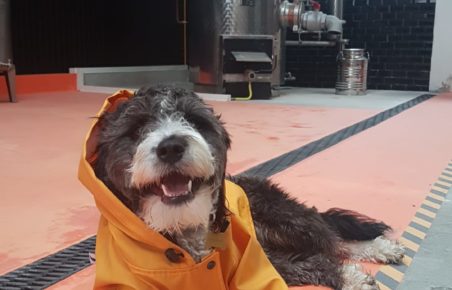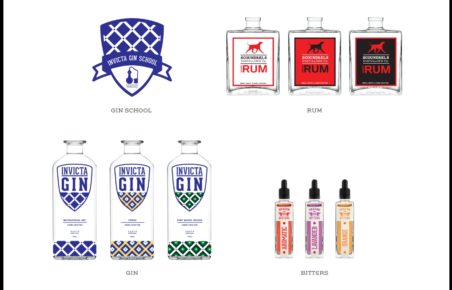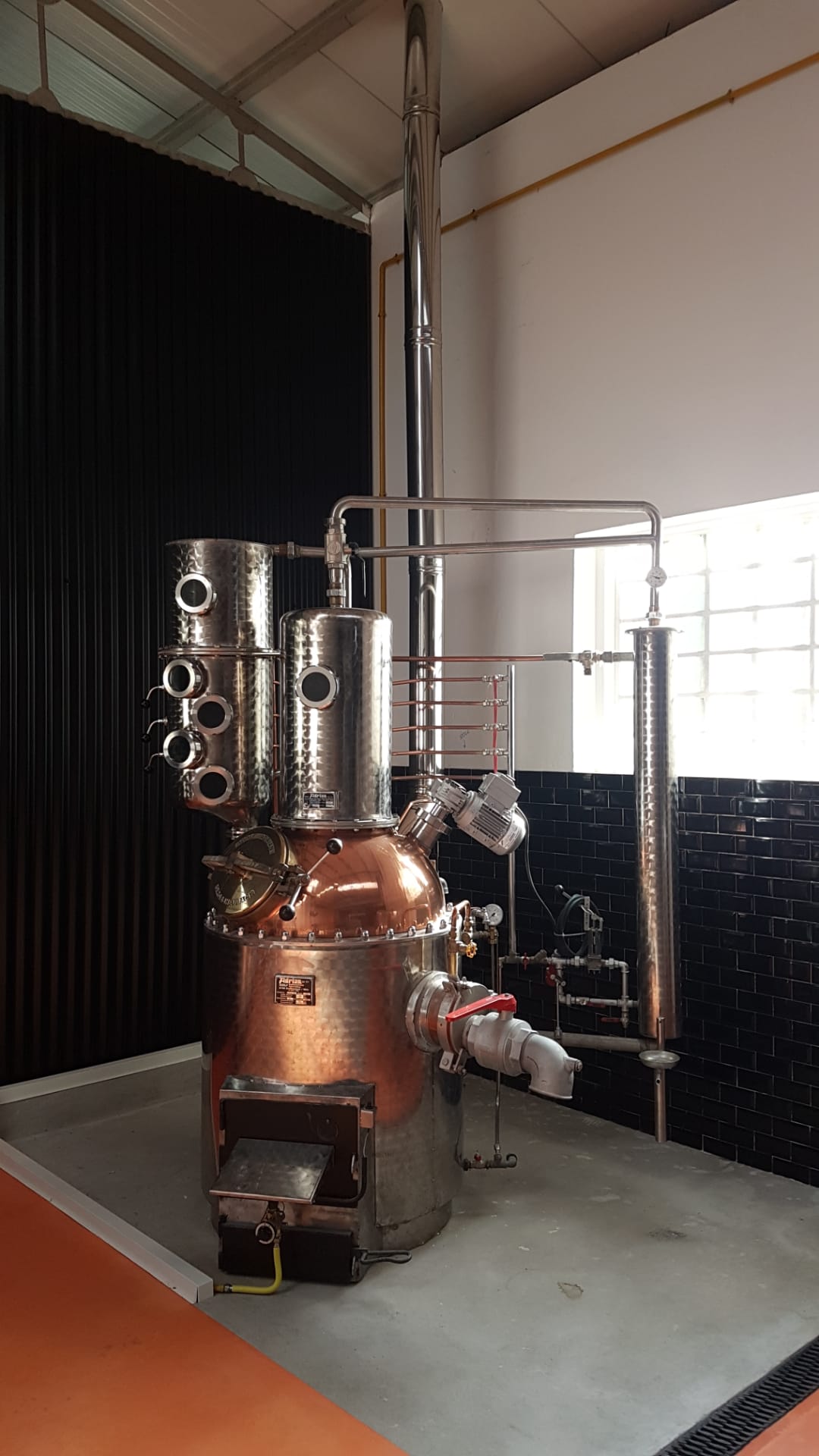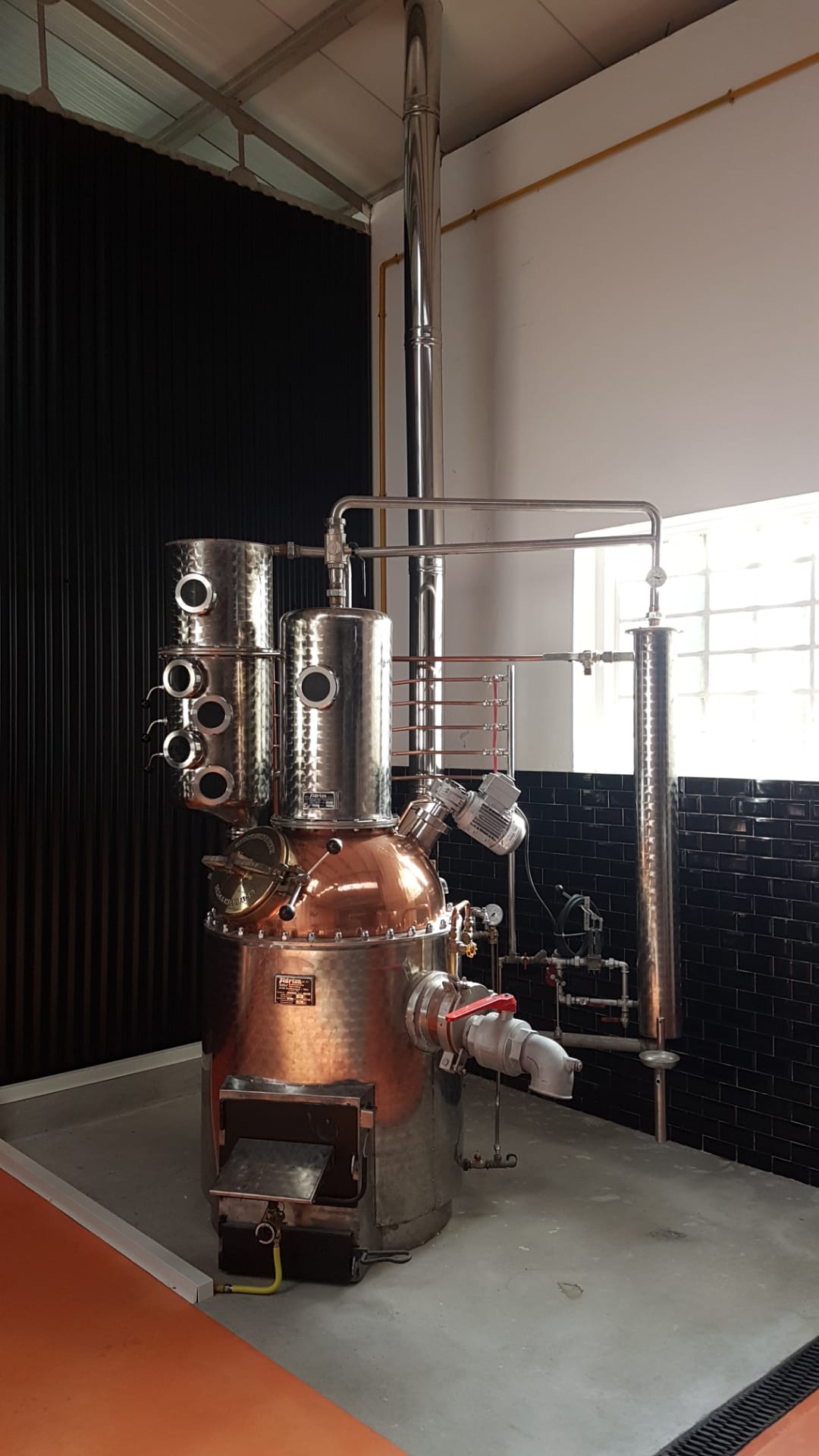New distillery finds a pot of gold at the bottom of the rainbow!
Scoundrels Distilling Co. is a new craft distillery in Porto, Portugal. Opposite a park, near a Metro station and with easy access to the city centre, they’re in a great location to attract customers once open. They will soon start producing their first gins, rums and cocktail bitters, as well as having a gin school. Co-founder and director, Travis Cunningham, has over 20 years’ work experience across multiple industries including agriculture, tourism, management consultancy, medical insurance and medical services. An entrepreneur at heart, he has managed businesses around the world. However, a background of home brewing and some time spent in the wine industry in Australia meant that the drinks industry was never far from his mind.
Idea develops
“The idea began in Cape Town in 2015“, says Travis. “We went there with a group of ex-pat mates that we’d made in Mongolia. There were about twenty of us, so we rented a house. My mate said ‘let’s drink a Dark and Stormy’, but there wasn’t a local rum!”
Originally, he wanted to set up a brewery somewhere with a friend as they had previously made some beer together. Concerns over beer’s quality when travelling long distances then made him decide to focus on spirits, in particular rum. Portugal became the country of choice for this new venture.
Choosing a location for the distillery
Porto has previously been voted ‘European destination of the year’ and has been building on that success. Spirits production is a growing sector, although it’s still relatively small. “Everyone’s making gin“, says Travis. “There’s a big brandy industry here with spirit being used in port fortification, but [the city’s] not really gone through a craft or small distillery phase like elsewhere. We moved to Porto as we can access port barrels at source to age our rum in. There’s nothing else here like what we’re looking to do.”
A few firsts
Travis is excited by the prospect of bringing something new to the Campanhã district of Porto, which he says became “the forgotten quarter of the city”. There is now significant government investment in developing the area and Travis wants to be at the forefront of this new opportunity. “We’re going to hit quite a few firsts – the first urban distillery in Porto for probably 50 years, the first gin school in Portugal and the first dedicated new tourism business in Porto’s Sao Roque/Corujeira area.”
Sourcing locally
Once bonded, Travis will begin buying in neutral spirit, made from wheat and rice, from a distillery in central Portugal. He’ll then be able to decide on the best quality water with the right pH for his products. He will also source botanicals as locally as possible to use in the different spirits. “We’re trying to source as much as we can from within Portugal. There are limitations, but we found some people who grow herbs and botanicals here in Porto. We’re also looking to use existing fruit – oranges and lemons – that have fallen on the ground or sitting on trees around the city and going to waste. Our view is that if we make a gin, cocktail bitter or spiced rum, we’re using similar botanicals and spices all the way through.”
Brand development

The company logo is based on the Portuguese water dog, Travis being a proud owner of one!
The Scoundrels Distilling brand was registered in April 2019. The name is based on George Bernard Shaw’s quote that ‘Every man over forty is a scoundrel.’ Because Travis is not operating all products under a single Scoundrels Distilling brand, he’s registered separate brand names in Portugal and the EU for the different products he’ll be making. These will be Invicta Gin, Dragon Bitters, the Scoundrels brand and Invicta Gin School. This gives him added versatility in his business model with potential for third party investment in different parts of the business.
“A friend explained to me that Invicta is the second name for Porto”, explains Travis. “It remained unconquered twice in its history when under attack. The word Invicta is actually in the city’s coat of arms and does mean ‘unconquered’. So, even with all the challenges that we’ve had, we’re also unconquered in what we’re trying to achieve!”
Dragon Bitters is so called, because the location of the distillery is opposite the Estádio do Dragão, the FC Porto stadium and their mascot is the dragon.
Focus on quality
Travis’ vision is to compete with high-quality craft brands, selling to bars and restaurants that want quality products. “We’re working with mixologists that want a quality, locally-made product. We’ll be getting them in because we have a huge amount of cocktail bars close to us. It’s a growing sector and maybe we can make a house gin for them, the way they want it.”
“There are a lot of gins here. Everybody’s going for that slightly different thing. I just want to make a really good dry gin, a really good citrus gin and I want to barrel-age some gin because we’re in Porto. I don’t want to do anything that looks like a gimmick. Our dry gin will be based on a London Dry, but we’re going to call it International Dry because of our international experience. The Portuguese Citrus Gin is based on the fact that we live in one of the most prolific citrus-growing areas of the world.”
Travis is also keen to acknowledge that although he plans to make rum, he will not rush it on to the market if the quality isn’t right. “We’re not going to put a white rum out there if we don’t think it makes the grade.”
Contacting Ryebeck for the still
Travis went to the USA with his business partner in 2016 for a distilling course at Moonshine University. This gave him a much more in-depth understanding of the industry. So, he looked into sourcing a Portuguese alembic still. However, limitations such as the lack of a column and the difficulties in attaching a vapour basket left him unsuccessful. Then, towards the end of 2018, he discovered Ryebeck and was immediately impressed by their knowledge and attitude.
“I really wanted a second hand still that we could repurpose“, he recalls. “Finding Ryebeck online, I reached out to Tim and asked him a few questions. I just found him the most helpful person I’d dealt with. In all the research I’ve done, he’s the guy who understands customer service. If somebody has a question, then he responds. I sent many emails to people and heard nothing back from them, so I just thought why bother persevering if they’re not interested now. I asked Tim if he could recommend anyone he’d worked with on a project before that I could talk to. So, he put me in contact with Jamie Jarrold of Jarrolds Gin. I had a good chat with him and he’s been a really big help to me as well.”
Industry co-operation
Thanks to Ryebeck’s introduction, Travis was able to discuss his plans with Jamie and gain the benefit of his experience. “He’s been willing to give me a huge amount of info. When I did the course in Kentucky, I was told that you’d struggle to find a more collegiate industry than the craft distilling industry. I took it with a pinch of salt but I think it’s actually true. People are more than happy to help each other out.”
Deciding on the right still for the new distillery
Following detailed discussions, Tim sourced a 150L second-hand still and explained how it could be customised. He then arranged a visit to the factory in Germany so that Travis and his business partner could see the still and clarify any outstanding issues. They then paid a deposit for the still in January 2019 and it was commissioned by Ryebeck in November 2019.
Throughout this time, Ryebeck worked closely with Travis and the manufacturer to source and modify a still that suited their customer’s requirements. Because of its prior operation only when fruit was in season, it’s had relatively low usage. “It’s 25 years old, but looks brand new“, describes Travis. “Originally wood-fired, the still has now been converted to gas. It’s had an agitator and a column bypass installed that allow us to do a one-shot gin through the vapour basket straight out of the top end of the condenser.”
“By starting with a 150L still, we have space to grow. We could buy another still, keep that [original] one and use it for bespoke rums later. We chose it because we can do the things that we need to, like single-shot gins, or we can use it to make rum with a double or triple distillation. It allows us to do small batches. Until we get everything right, it’s pointless having a giant still.”
A pot of gold at the bottom of the rainbow!
One incident in particular from his visit to the factory sticks in Travis’ memory. “As we were driving down, we got within a kilometre of the factory. It had been raining and the sky cleared. There was a rainbow and we thought wouldn’t it be funny if at the bottom of the rainbow was the factory – and it was! It was quite a surreal experience – a sign from the universe that we’re on the right path!”
Facing challenges
Travis has extensive expertise in start-up projects, but this latest venture is not short of challenges. “We’ve had a huge amount of delays. We took a lease on the property in November 2018. Here we are in 2020 and we’re still not open. We waited six months for a gas connection, then we hit summer, so lost all the time with contractors who went to do other work.”
Gas connection for the distillery
Among the biggest challenges were the logistical difficulties of having a gas connection installed and then a chimney fitted to allow the heat from the still to escape. “We had signed the paperwork for a gas connection at the beginning of January 2019 and I was told that it would be a seven-week wait. So, I asked Ryebeck to send us the still in May. We couldn’t wait any longer and we had contractors lined up to do construction. Then our gas didn’t get connected until the end of June. It was almost six months to put together the gas connection!”
Unforeseen delays
Unforeseen delays didn’t end there, as Travis remembers only too well. “We couldn’t get the gas connection signed off as quickly as we thought, because we had to get a chimney made. We just thought we could buy one from our local hardware store, but they don’t have the same standards here as in the UK, Germany, Sweden etc. It’s a 160ml diameter pipe and here they have 120, 150, 180, 200. So we had to get it manufactured. Then it rained for five solid weeks, so we couldn’t get on to the roof to cut a hole to install the chimney. So we lost another five weeks! We didn’t actually finalise the gas connection officially until November, because we had to get it signed off by the inspector first. So it took almost a year!”
“I don’t think most people would believe the challenges that come with trying to do something like this. So much of this is out of your control. In my mind, I was going to be open in June and we’re almost eight months late and we’re still not open. The hardest part is getting out of bed and being optimistic! There’s a huge amount of positives, but all in all, it’s been such a challenging period.”
Vision
Although living in a new country, starting a new business in a different sector and faced with language barriers, Travis remains undaunted. “I’m working on the basis of 50% ignorance and 50% energy. I’ve built what is going to be an amazing space. My vision in terms of seeing a gap in the market is very clear to me. I still feel as positive about it now as when I started, even if we’re not open after so many months. I still know this thing’s going to work … otherwise I wouldn’t do it.”
Business realism
Despite the many challenges, Travis is clearly enthusiastic about creating a new company in the drinks sector. His business mantra is firmly based on an entrepreneurial mindset: “If it’s your own money, would you spend it?“. This has made him focus his attention on avoiding pitfalls that lead to potential business failure.
“I love the craft aspect of it“, he adds. “I love every part of this industry and I think it’s one of the most amazing industries I’ve been involved with in my life. At the end of the day though, I’m a realist. I’ve read many articles and one of the articles was on why distilleries fail. I was more interested in this than success stories. A guy from an American company said: ‘Ultimately we’re a marketing company that happens to make booze. If we always focus on trying to make the best product all the time and did nothing on selling it or marketing it, we wouldn’t even have a business. That’s the reason we’re still here.’ So I thought that was really interesting and that’s a good mandate to live by.”

Scoundrels Distilling Co., Invicta Gin & Dragon Bitters Brands
Gin school and distillery
Once the business is fully licensed and bonded, Travis can take delivery of the neutral spirit. His plan is to start by producing gin and launching the gin school. This will create cashflow and help cover outgoings as he begins making rum as well. “We need the gin packaged and presentable with merchandising ready for the gin school“, he explains.
Rather than operating a bar and selling gin direct to consumers that way, his main focus is on export markets. Additionally, he wants to attract business to the gin school from tourists, corporate customers and others. Visitors would spend around 3½ hours learning about gin, it’s history and the production process, before making a bottle of gin which they take away. “We’re not running a bar. We’re running a distillery. The idea is that we’re pushing responsible serving of alcohol from here. We just want to be a distillery and a gin school.”
Customers will also be able to buy tickets for a tour of the distillery to include a tasting of gins and bitters. Travis plans to use his space for events as well, including art exhibitions, photo shoots, private functions and distillery dinners with visiting chefs. “We don’t want to be a circus. We want to be a professional business and get a really good reputation for being good hosts – that we run a great school, our merchandising is of high quality and the products we make are fantastic.
The Ryebeck experience
These are bold plans which have already faced plenty of challenges, but thanks to Ryebeck’s help are soon to become a reality. Travis is already thinking about future needs. If all goes to plan, he hopes to be able to ramp up production within the next six months or so.
Likely to require an additional larger still, Ryebeck remains his first-choice partner. “We would not necessarily buy a new still. I think there’s every chance that we would buy a second-hand one again. That’s a good reason to work with Ryebeck, because they have a network that we don’t. I realised once we started working with them that there was no way we would have found that still on our own. So, I have no doubt we’ll be keep working with them. I like Tim’s professionalism. I’ve met so many people over the years that say one thing and do another. He’s not like that.”
“It’s been a really positive experience. The challenge that we would have had by going alone was made a lot easier by working with Ryebeck. They’ve been really quick with responding to questions. I just think they’re a professional company. I haven’t met anyone else in the industry that do what they do. It’s pretty obvious to me that they’re very good. I have no issue recommending them to anyone else.”
If you’re interested in purchasing distillation equipment, then Ryebeck can help. You can call the team on +44 (0) 800 689 3216 or contact them via their online form.
Author: Robin Goldsmith of The Write Taste.






